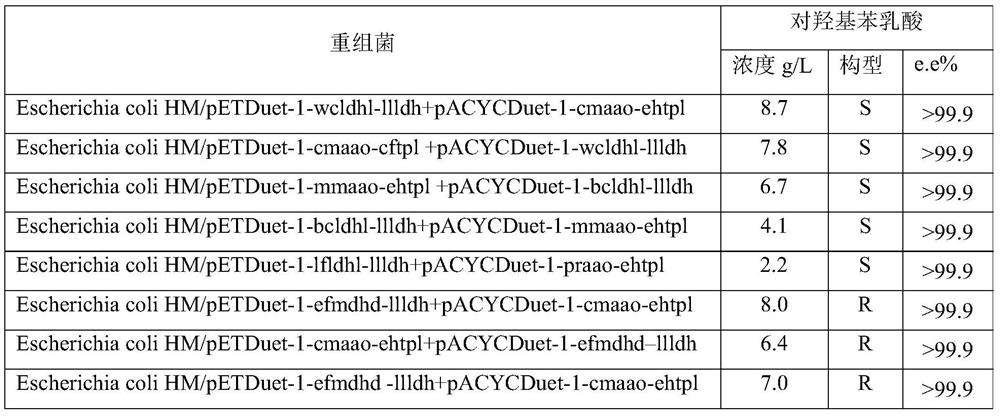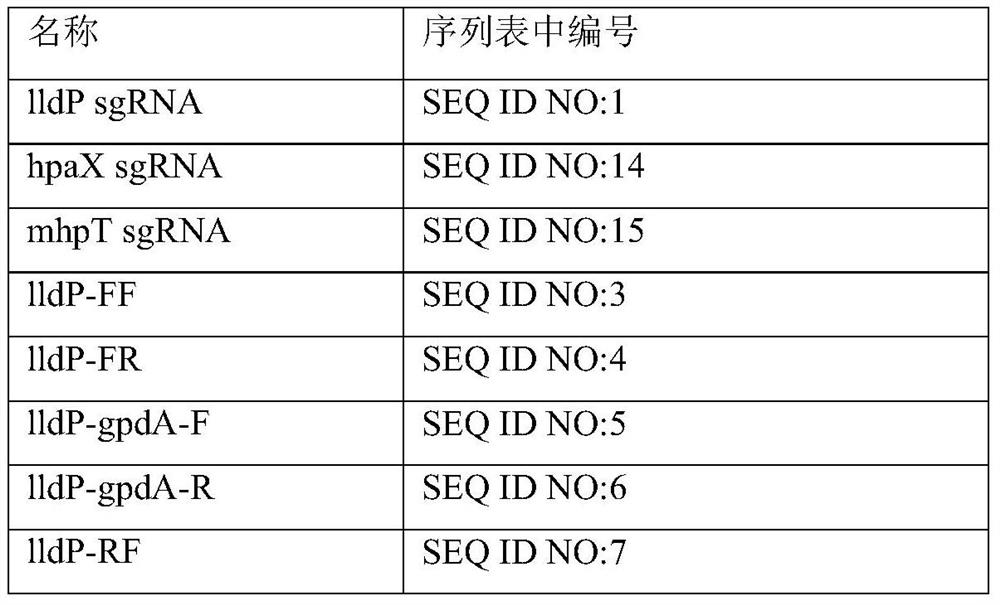An engineering bacterium and its application to produce p-hydroxyphenyl lactic acid with cheap substrate
A technology of hydroxyphenyl lactic acid and hydroxycarboxylic acid, applied in the field of bioengineering, can solve the problems of low yield and high cost, and achieve the effects of easy availability of raw materials, simple production process and good prospects for industrial application
- Summary
- Abstract
- Description
- Claims
- Application Information
AI Technical Summary
Problems solved by technology
Method used
Image
Examples
Embodiment 1
[0076] According to the method described in the literature Large scale validation of an efficient CRISPR / Cas-based multigene editing protocol in Escherichia coli. Microbial Cell Factories, 2017, 16(1): 68, hpaD and mhpB on Escherichia coli BL21 (DE3) were singled out or double knockout. Among them, the gene knockout plasmid used in the present invention is pCasRed and pCRISPR-gDNA (hpaD sgRNA) and the homology arm (hpaDdonor) are introduced into Escherichia coli BL21 (DE3), and Cas9 / sgRNA induces the host to generate double strands at the hpaD gene locus Break, the recombinase Red integrates the hpaD donor into the hpaD gene to achieve gene knockout, and sequence verification. hpaD sgRNA, hpaD donor, mhpB sgRNA, and mhpB donor are respectively shown in the sequence listing SEQ ID NO:10, SEQ ID NO:11, SEQ ID NO:12, and SEQ ID NO:13. mhpB was knocked out in the same way.
[0077] Prepare a solution with a pH of 8, 2 g / L of phenol or D-p-hydroxyphenyl lactic acid, 100 g / L of we...
Embodiment 2
[0082] Comparison of enzymatic properties of alpha-hydroxycarboxylic acid dehydrogenases. Usually, such enzymes may also have the ability to reduce pyruvate to generate lactic acid, so enzymes that cannot reduce pyruvate or very weakly reduce pyruvate are better. Using pyruvate as a substrate, the reducing ability of different enzymes was compared. According to the literature (cloning, expression, purification and enzymatic properties of Serratia marcescens H3010 fermentative D-lactate dehydrogenase gene. Industrial Microbiology, 2012, 42 (04): 30-37.) The described method measurement takes NAD as the activity of coenzyme reducing pyruvate, and experimental result is as shown in table 1.
[0083] Induced expression method: the recombinant Escherichia coli is transferred to LB fermentation medium (peptone 10g / L, yeast powder 5g / L, NaCl 10g / L) in the amount of 2% by volume ratio, when the cell OD 600 After reaching 0.6-0.8, add IPTG with a final concentration of 0.4mM, induce e...
Embodiment 3
[0087] Recombinant Escherichia coli construction: First, the genes encoding tyrosine phenol lyase, L-amino acid oxidase, α-hydroxycarboxylic acid dehydrogenase and L-lactate dehydrogenase were connected to pETDuet-1 or pACYCDuet-1 plasmids respectively superior. Two kinds of double-gene co-expression recombinant plasmids were obtained, and the two plasmids were transformed into Escherichia coli BL21, and positive transformants were obtained by screening with chloramphenicol and ampicillin plates, that is, recombinant Escherichia coli was obtained.
[0088] After the induction and expression of recombinant Escherichia coli is completed, the bacterial cells are collected. In a reaction volume of 100ml, the wet weight of the cells is 20g / L, the concentration of phenol is 10g / L, the concentration of L-lactic acid is 10g / L, pH 8.0, and the concentration of ammonium ion is 30g / L; react at 35°C for 12 hours. After the conversion, the yield and configuration of p-hydroxyphenyl lacti...
PUM
 Login to View More
Login to View More Abstract
Description
Claims
Application Information
 Login to View More
Login to View More - R&D
- Intellectual Property
- Life Sciences
- Materials
- Tech Scout
- Unparalleled Data Quality
- Higher Quality Content
- 60% Fewer Hallucinations
Browse by: Latest US Patents, China's latest patents, Technical Efficacy Thesaurus, Application Domain, Technology Topic, Popular Technical Reports.
© 2025 PatSnap. All rights reserved.Legal|Privacy policy|Modern Slavery Act Transparency Statement|Sitemap|About US| Contact US: help@patsnap.com



